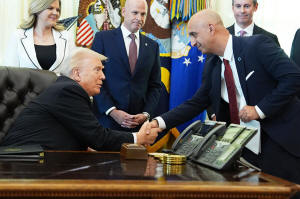Trump unveils deal to expand coverage and lower costs on obesity drugs
[November 07, 2025]
By TOM MURPHY, AAMER MADHANI and JONEL ALECCIA
WASHINGTON (AP) — President Donald Trump unveiled a deal Thursday with
drugmakers Eli Lilly and Novo Nordisk to expand coverage and reduce
prices for the popular obesity treatments Zepbound and Wegovy.
Known as GLP-1 receptor agonists, the drugs have soared in popularity in
recent years, but patient access has been a consistent problem because
of their cost — around $500 a month for higher doses — and insurance
coverage has been spotty. More than 100 million American adults are
obese, according to federal estimates.
Coverage of the drugs for obesity will expand to Medicare patients
starting next year, according to the administration, which said some
lower prices also will be phased in for patients without coverage.
Starting doses of new, pill versions of the treatments also will cost
$149 a month if they are approved.
“(It) will save lives, improve the health of millions and millions of
Americans,” said Trump, in an Oval Office announcement in which he
referred to GLP-1s as a “fat drug.”
Thursday's announcement is the latest attempt by the Trump
administration to rein in soaring drug prices in its efforts to address
cost-of-living concerns among voters. Pfizer and AstraZeneca recently
agreed to lower the cost of prescription drugs for Medicaid after an
executive order in May set a deadline for drugmakers to electively lower
prices or face new limits on what the government will pay.
As with the other deals, it’s not clear how much the price drop will be
felt by consumers. Drug prices can vary based on the competition for
treatments and insurance coverage.

Obesity drugs are popular, but costly
The obesity drugs work by targeting hormones in the gut and brain that
affect appetite and feelings of fullness. In clinical trials, they
helped people shed 15% to 22% of their body weight -- up to 50 pounds or
more in many cases.
Patients usually start on smaller doses and then work up to larger
amounts, depending on their needs. They need to stay on the the
treatments indefinitely or risk regaining weight, experts say.
The medications have proven especially lucrative for Lilly and Novo.
Lilly said recently that sales of Zepbound have tripled so far this year
to more than $9 billion.
But for many Americans, their cost has made them out of reach.
Medicare, the federally funded coverage program mainly for people ages
65 and over, now covers the cost of the drugs for conditions such as
type 2 diabetes and cardiovascular disease, but not for weight loss
alone. Trump’s predecessor, Joe Biden, proposed a rule last November
that would have changed that, but the Trump administration nixed it.
Few state and federally funded Medicaid programs, for people with low
incomes, offer coverage. And employers and insurers that provide
commercial coverage are wary of paying for these drugs in part because
so many people might use them.
The $500 monthly price for higher doses of the treatments also makes
them unaffordable for those without insurance, doctors say.
Trump tries to show he is in touch with cost-of-living concerns
Thursday's announcement comes as the White House is looking to
demonstrate that Trump is in touch with Americans' frustrations with
rising costs for food, housing, health care and other necessities.
“Trump is the friend of the forgotten American,” said Health and Human
Services Secretary Robert F. Kennedy, Jr. at Thursday's announcement.
“Obesity is a disease of poverty. And overwhelmingly, these drugs have
only been available for people who have wealth.”
(Obesity rates actually are slightly higher for middle-income Americans
than they are for those with the lowest and highest incomes, according
to 2017-2020 data collected by the U.S. Centers for Disease Control and
Prevention.)

[to top of second column]
|

President Donald Trump, left, shakes the hand of Novo Nordisk
President and CEO Mike Doustdar during an event about drug prices,
Thursday, Nov. 6, 2025, in the Oval Office of the White House in
Washington. (AP Photo/Evan Vucci)

Kennedy had previously expressed skepticism about GLP-1s, but he was
full of praise for Trump for pushing to help a broader segment of
Americans have access to the drug.
Trump, who has a history of commenting on people's appearance, asked the
officials who joined him in the Oval Office whether they had used the
weight-loss medications.
“Do you take any of this stuff, Howard?” Trump asked Commerce Secretary
Howard Lutnick. “Not yet,” Lutnick replied. “He’s taking it,” the
president said of Steven Cheung, who is the White House director of
communications.
The drug-pricing announcement came days after Democrats swept elections
in races across the country. Economic worries were the dominant concern
for those casting their ballots, according to findings from the AP voter
poll.
Plan calls for phased-in price reductions
The White House sought to diminish price-reduction efforts by the
previous Democratic administration as a gift to the pharmaceutical
industry.
Trump, instead, consummated a deal that ensures Americans aren’t
unfairly financing the pharmaceutical industry’s innovation, claimed a
senior administration official, who briefed reporters ahead of
Thursday’s Oval Office announcement.
Another senior administration official said coverage of the drugs will
expand to Medicare patients starting next year. The program will start
covering the treatments for people who have severe obesity and others
who are overweight or obese and have serious health problems, the
official said. Those who qualify will pay $50 copays for the medicine.
Lower prices also will be phased in for people without coverage through
the administration’s TrumpRx program, which will allow people to buy
drugs directly from manufacturers, starting in January.
Administration officials said the average price of the drugs sold on
TrumpRx will start at around $350 and then drop to $245 over the next
two years.

A Novo Nordisk spokesperson declined to provide details on their pricing
changes.
Lilly said it will sell a starter dose of Zepbound for $299 a month and
additional doses at up to $449. Both represent $50 reductions from
current prices for doses it sells directly to patients.
Administration officials said lower prices also will be provided for
state and federally funded Medicaid programs. And starting doses of new,
pill versions of the obesity treatments will cost $149 a month if they
are approved.
U.S. health regulators on Thursday separately agreed to dramatically
expedite review of Lilly's obesity pill, orforglipron. An FDA decision
on Novo Nordisk's Wegovy pill is expected later this year.
Doctors who treat patients for obesity say help is needed to improve
access. Dr. Leslie Golden says she has roughly 600 patients taking one
of these treatments, and at least 75% struggle to afford them. Even with
coverage, some face $150 copayments for refills.
“Every visit it’s, ‘How long can we continue to do this? What’s the plan
if I can’t continue?’” said Golden, an obesity medicine specialist in
Watertown, Wisconsin. “Some of them are working additional jobs or
delaying retirement so they can continue to pay for it.”
___
AP Health Writer Matthew Perrone contributed to this report.
All contents © copyright 2025 Associated Press. All rights reserved |